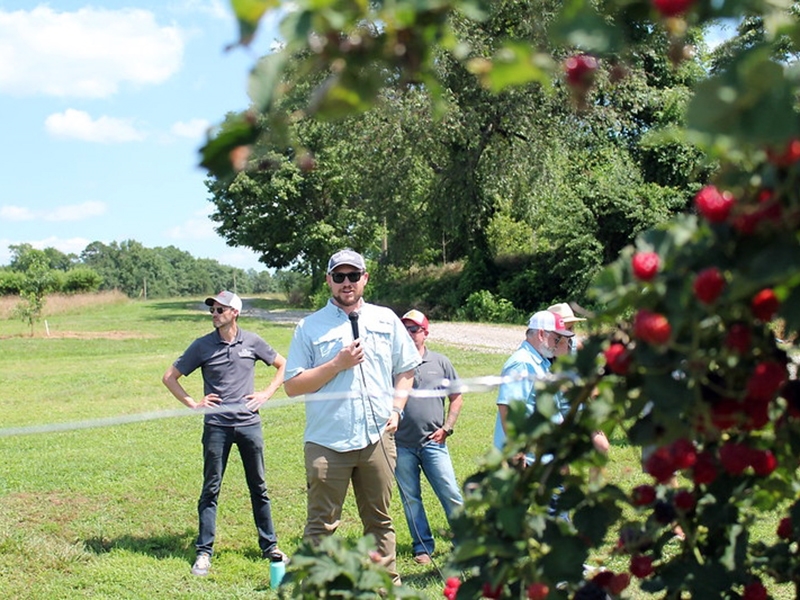
It's blackberry season in Arkansas, and the spotted-wing drosophila, an invasive fruit fly, has already been spotted in blackberry fields. This non-native species can cause significant problems for blackberry growers. New research is shedding light on a trellising system that could enhance pest management against spotted-wing drosophila.
In this latest episode of Food, Farms & Forests, Aaron Cato explains research that shows the rotating cross-arm (RCA) trellis offers better spray coverage than the more commonly used T-trellis.
One of the study's most significant findings was that the RCA trellis system improves the effectiveness of insecticide sprays by fourfold. This increased coverage means growers can potentially use less water and still achieve effective pest control, reducing costs and environmental impact.
The data also showed that the RCA offers more light penetration and airflow to create more heat and less humidity. The microclimate is less inviting for spotted-wing drosophila larvae.
"There's more than just insecticides to control pests like spotted-wing," Cato said. "I hope that growers see that, especially in specialty crops, you have to rely on your cultural controls for a long-term approach to best management. Because spotted-wing drosophila is becoming resistant to insecticides. So, you can't rely just on those things alone, or you're not going to be able to keep them out of folks' berries in the future."
The episode can be found in the player above or by visiting the Food, Farms & Forests page. The podcast is available on Apple Podcasts, Spotify, YouTube Music and iHeart Radio.
About the researcher: Aaron Cato conducts research for the Arkansas Agricultural Experiment Station, the research arm of the U of A System Division of Agriculture. He is an extension specialist in the horticulture department focusing on integrated pest management.
About Food, Farms & Forests: The Food, Farms & Forests podcast explores the latest food, fiber and forestry research from the Arkansas Agricultural Experiment Station. Scientists with the University of Arkansas System Division of Agriculture share their scientific discoveries and innovations in the food and agriculture industries, explaining the methods and purpose behind their work.
About the Division of Agriculture: The University of Arkansas System Division of Agriculture's mission is to strengthen agriculture, communities, and families by connecting trusted research to the adoption of best practices. Through the Agricultural Experiment Station and the Cooperative Extension Service, the Division of Agriculture conducts research and extension work within the nation's historic land grant education system. The Division of Agriculture is one of 20 entities within the University of Arkansas System. It has offices in all 75 counties in Arkansas and faculty on five system campuses. The University of Arkansas System Division of Agriculture offers all its Extension and Research programs and services without regard to race, color, sex, gender identity, sexual orientation, national origin, religion, age, disability, marital or veteran status, genetic information, or any other legally protected status, and is an Affirmative Action/Equal Opportunity Employer.
Topics
Contacts
Jenifer Fouch, communications specialist
Agricultural Communications Services
479-502-9732, jfouch@uark.edu